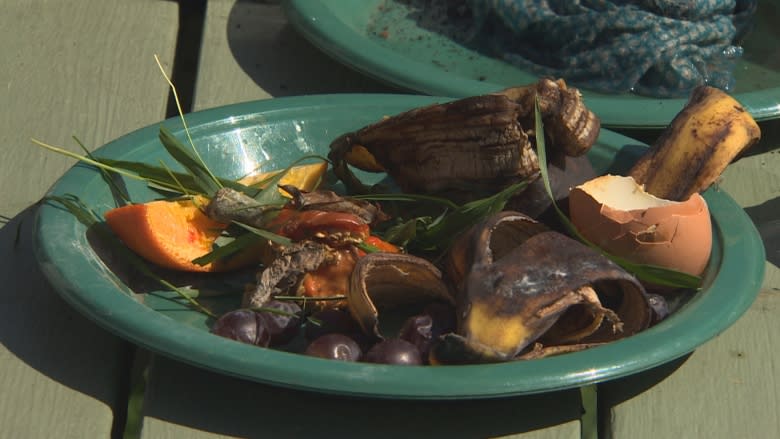Composting queries up 75 per cent in Edmonton from last year
More Edmontonians seem willing to get their hands dirty.
Interest in composting has spiked this year with inquires up nearly 75 per cent this past April from 2017, the city says.
People have been calling, emailing and visiting the John Janzen Nature Centre near Fort Edmonton Park where Mark Stumpf-Allen teaches composting workshops.
Stumpf-Allen, the city's composting program coordinator, said workshops during the spring and summer this year are full.
"There is definitely a strong shift — this spring especially — towards people wanting to be more environmentally friendly and sustainable and regenerative," he told CBC News Friday.
This is welcome news to Coun. Michael Walters, who's been encouraging Edmontonians to take a proactive approach to waste management.
"Those are exciting statistics to hear," he said. "I think people are taking up the challenge."
Edmonton's reputation in waste management has taken a hit this year.
Once considered world-leading, Edmonton's waste management system received a bad report card earlier this year showing it has fallen short of its once-lofty target of diverting 90 per cent of residential garbage from the landfill.
An audit showed the city has only diverted 51 per cent of residential waste over the past five years.
City councillors say residents need to start sorting at home.
"There was a notion that it was a city-run as opposed to a citizen-run waste management system and I think what we've learned is it has to be both," Walters said. "It's a partnership between the citizens and the municipality to be the kind of waste management leaders that we thought we were."
The negative news started last fall, when the city shut down the composting facility after engineers found a structural problem with the roof.
The facility re-opened in April in time for the summer season when yard waste collection goes up but the city will close it again in the late fall. The facility will have to be replaced within two years, the city says.
Walters said composting is just one component of what will help Edmonton regain its reputation as a world-leader in waste management.
"When ultimately we have separate organic waste separated from solid waste, separate from recyclables, we've created the basis of an excellent waste management system that can work in collaboration with the high-tech facilities that we've built," Walters said.
The basics
Stumpf-Allen said most people who've been calling the city in recent months ask about the basics.
"Our most common questions are how do I compost, what do I add and how do I add it?" he said.
The four main ingredients for composting are greens, browns, water and air.
Food scraps or greens are collected in a pail or bucket and transferred to an indoor or outdoor composting bin.
Brown elements, such as dried leaves, shredded paper and onion peels, create a base for the greens.
Meat and fish products are not recommended because of the intense odours they can create.
Stumpf-Allen recommends turning the compost on average once a week. In about three months, the product should be ready to put on gardens or lawns.
Kinds of composters
There are two basic types of backyard composters: a rectangular plastic bin with a lid and a dome-shaped bin.
Some people make their own composters out of wood and wiring.
Worms have been traditionally used for indoor composters but Stumpf-Allen said a fermentation process known as bokashi is becoming more popular. It uses materials in an air-tight vessel — with greens, browns, water and no air — to ferment waste
It's possible to compost during the winter, although Stumpf-Allen warns the bin may be full by January or February. By spring, there will be a lot more compost at the bottom of the bin.
"The bacteria are working even at minus 20 — very slowly mind you — they're not getting a lot done, and the enzymes that they use tend to freeze up and slow down as well, so it's a really slow process," he said.
Leaves and grass
Experts in lawn care and gardening, as well as the city, urge homeowners to leave grass clippings and mulched leaves on lawns.
Stumpf-Allen said yard waste and grass clippings are full of nitrogen and moisture and keep lawns healthy.
"It's going to help to conserve water in the soil to protect it from wind drying out and help to build nice deep, rich top soil," he said.
The city plans to stop regular pick-up of these materials at the end of the summer.
Stumpf-Allen said it's important to chop leaves up into smaller pieces. He encourages people to get a mulching lawn mower, which doubles as a regular mower.
Leaves can also be composted in a bag over the winter.
Currently, the city doesn't have community drop-off points for organics but administration is looking at introducing an organics pick-up system by 2020.
@natashariebe




